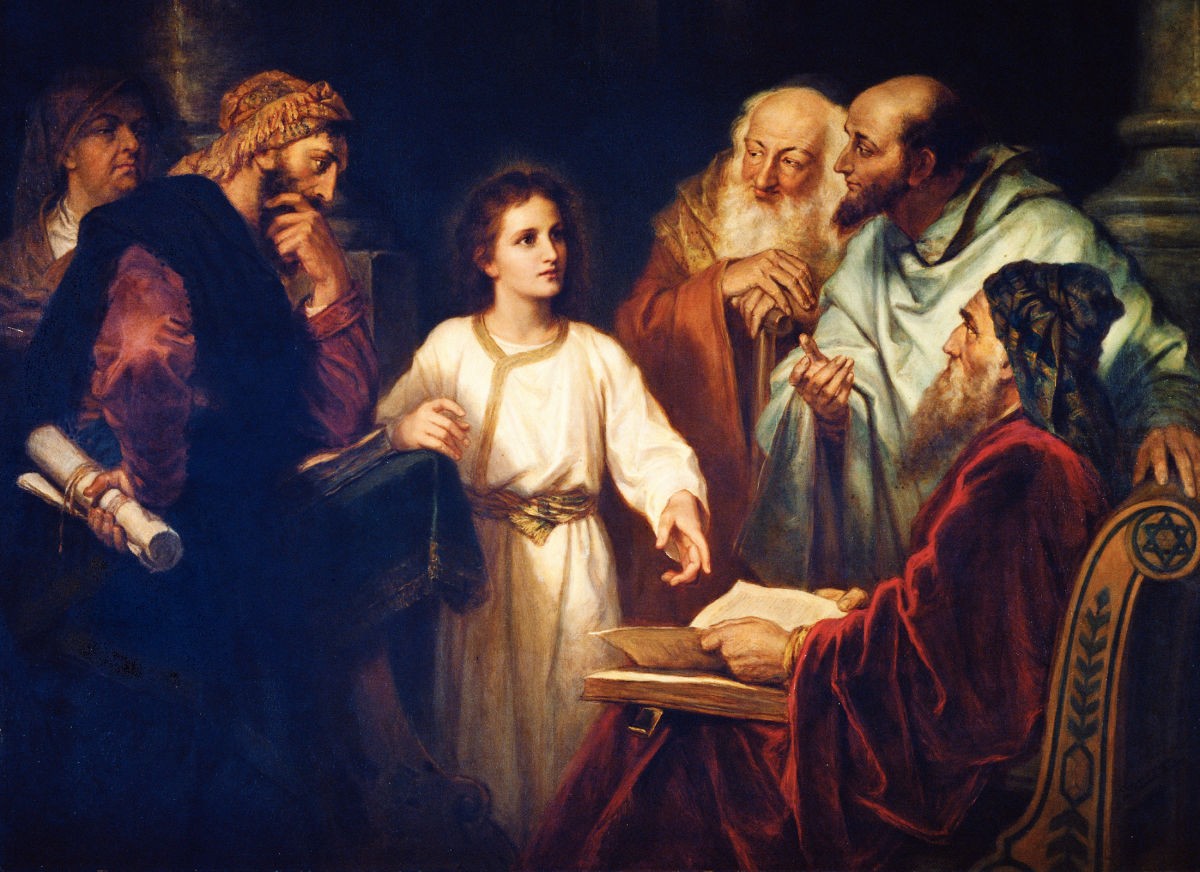
The boy Jesus, left behind at the Temple
This old painting recalls the open spirit of the Temple and synagogues and of house meetings, too. An "open-mike" sort of meeting. Where ideas were tried and considered, questions posed and answered.
The original painting, by German Heinrich Hofmann, went to auction less than a year ago. Very interesting.
Oh my, think of the trust among neighbors and relatives wherein a child could be separated from parents for many hours and nobody seemed to be worried.
Years later, Paul the apostles wrote: Two or three prophets should speak, and the others should weigh carefully what is said. 1 Corinthians 14:29. Prove all things, hold onto what is good! 1 Thessalonians 5:21
-
- · Todd Buiten
- ·
My work as a computer programmer often has me relating seemingly disparate events into a single, cohesive "big picture" narrative. I hope that you'll forgive me for doing what now comes so naturally to me. I hope that my comments will be edifying for the entire community...
Over the last few days, I've been thinking about the recent post on TF Torrence and the rise of the popular minister in the church (https://housechurch.org/page/view-article?id=8). I couldn't agree more with that article. As I read it, it reminded me of a question that I have been meaning to follow up on. That question is this... does the word "preach" in the Bible mean what the church says it does today, which is synonymous with "lecture". After all, when Joel Osteen stands in front of 45,000 congregants each week, he effectively has a bully pulpit and can say whatever he wants. When was the last time you sat in a church and the pastor said something suspect and someone stood up in the congregation to say, "hey, wait a minute buddy, that just doesn't sound right. Here's what I think Scripture means"? I actually saw this happen once when I was quite young and the old guy in the row directly in front of me stood up from the pew to question the pastor's teaching. But because we are trained to be "reverent" and let the guy behind the pulpit run the show, no one ever actually makes such challenges. Our culture today very much values the opinions of the "experts". This is just as much, of not more, true in the church today. And this has lead to the rise of these charismatic preachers because there is no accountability to Christ coming from within the church body
So if you've made it this far (and thanks if you have 😀 ), you must be asking yourself what this has to do with Christ teaching in the Temple. Where I see a connection is that I believe to "preach" or "proclaim" does not necessarily mean to "lecture". Sure, there is a time and place for lecturing, but I do not think that it's intended to be exclusive for communicating the Word. Indeed, I wonder if it's even meant to be an activity that takes up the majority of our efforts when it comes to the time spent teaching and preaching. Indeed, when Mary and Joseph returned to Jerusalem to find Jesus in the temple, Scripture tells us that He was "sitting among the teachers, listening to them and asking them questions." (Luke 2:46b). Imagine that... the Savior of the world and Lord of all creation sitting and asking questions of some puny humans. If anyone had reason to be a lecturer on Scripture it would have been Jesus at this time and in this place. Yet He chose to listen to and question them rather than tell them what they should believe. He taught interactively
We see the same of Paul with the men of Athens. While Paul did in fact proclaim Christ, the Bible also mentions that "[Paul] was reasoning in the synagogue with the Jews" (Acts 17:17). This does not sound much to me like a one-way conversation. Indeed, when Paul writes in the New Testament he often asks questions that I'm sure that he'd been asked before. He is aware of the objections and seeks to answer them. This is completely different teaching method than anything that we see in churches today
Thank you so much for your post, brother. You help open our eyes to the truth of Scripture perhaps far beyond what you had originally intended
-
- · Dan Beaty
- ·
Todd, Thanks for posting this. You wrote: "And this has lead to the rise of these charismatic preachers because there is no accountability to Christ coming from within the church body."
It got me thinking of accountability. There is accountability, but not always to Christ. In order to become popular, some are careful to not offend the people who support them.
Your point about "preaching" as proclaiming instead of lecturing is important. Even teaching in the scriptures often implies dialog. I realize too that there is a place for a monologue as in the preaching of Billy Graham in a stadium. However, as the original post points out, that was not the norm in New Testament times.
Many times I have heard he story of Paul preaching so long that a boy feel into a deep sleep and fell down from the third floor. The Greek word is the one from where we get "dialog." In other places it is translated "reasoned with."
There is a book entitled, "The influence of Greek ideas on Christianity." In it the author shows how the Greeks developed the art of public speaking until it was more about entertaining or persuasion than instruction. As Christianity moved westward, it moved gradually away from the New Testament patterns. It is an interesting read.